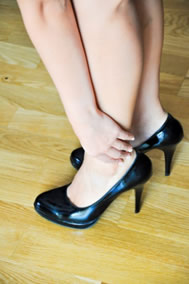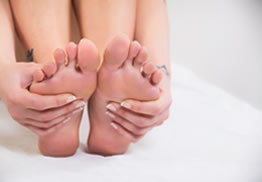Items filtered by date: January 2017
Tips for Wearing High Heels
 High heels are a pair of shoes nearly every woman has in her closet. Many women, however, overlook the quality and comfort of their high heels in favor of style. This can be detrimental for the feet in the long run. Women should consider the following seven key guidelines when choosing their next pair of heels: invest in quality materials, such as leather; look for shoes that are well-stitched and properly lined; take your heels to the cobbler if you need to ensure loose parts are fitted correctly; try on the shoe before purchasing; select a heel height that is comfortable for you; choose your heel thickness based on how heavy or light-footed you are; and invest in shoe sprays to prolong the life of your high heels.
High heels are a pair of shoes nearly every woman has in her closet. Many women, however, overlook the quality and comfort of their high heels in favor of style. This can be detrimental for the feet in the long run. Women should consider the following seven key guidelines when choosing their next pair of heels: invest in quality materials, such as leather; look for shoes that are well-stitched and properly lined; take your heels to the cobbler if you need to ensure loose parts are fitted correctly; try on the shoe before purchasing; select a heel height that is comfortable for you; choose your heel thickness based on how heavy or light-footed you are; and invest in shoe sprays to prolong the life of your high heels.
High heels have a history of causing foot and ankle problems. If you have any concerns about your feet or ankles, contact Dr. Joshua David Scoll of Pennsylvania. Our doctor can provide the care you need to keep your pain free and on your feet.
Effects of High Heels on the Feet
High heels are popular shoes among women because their style and societal appeal. Despite this, they can still cause many health problems if worn too frequently.
What parts my body will be affected by high heels?
- Ankle Joints
- Achilles Tendon – may shorten and stiffen with prolonged wear
- Balls of the Feet
- Knees – heels cause the knees to bend constantly, creating stress on them
- Back – they decrease the spine’s ability to absorb shock, which may lead to back pain. Also, the vertebrae of the lower back may compress.
What kinds of foot problems can develop from wearing high heels?
- Corns
- Calluses
- Hammertoe
- Bunions
- Morton’s Neuroma
- Plantar Fasciitis
How can I still wear high heels and maintain foot health?
If you want to wear high heeled shoes, make sure that you are not wearing them every day, as this will help prevent long term physical problems. Try wearing thicker heels as opposed to stilettos to distribute weight more evenly across the feet. Always make sure you are wearing the proper shoes for the right occasion, such as sneakers for exercising. If you walk to work, try carrying your heels with you and changing into them once you arrive at work. Adding inserts to your heels can help cushion your feet and absorb shock. Full foot inserts or metatarsal pads are available.
If you have any questions please feel free to contact our office located in Philadelphia and Bensalem, PA. We offer the newest diagnostic tools and technology to treat your foot and ankle needs.
Softening Corns and Calluses for Removal
 Among foot conditions, corns and calluses are often seen as some of the more harmless concerns. Regardless, if a corn or callus does become troublesome, there are methods available for removal. Because calluses are essentially small areas of thick, hardened skin, softening calluses can help aid in their removal. Soaking the feet in warm water and avoiding using harsh soaps while washing can help maintain softness of the skin. Hard areas can also be buffed away using a pumice stone. If you are suffering from corns and calluses and seek ways to remove them, consult with your podiatrist.
Among foot conditions, corns and calluses are often seen as some of the more harmless concerns. Regardless, if a corn or callus does become troublesome, there are methods available for removal. Because calluses are essentially small areas of thick, hardened skin, softening calluses can help aid in their removal. Soaking the feet in warm water and avoiding using harsh soaps while washing can help maintain softness of the skin. Hard areas can also be buffed away using a pumice stone. If you are suffering from corns and calluses and seek ways to remove them, consult with your podiatrist.
If you have any concerns regarding your feet and ankles, contact Dr. Joshua David Scoll of Pennsylvania. Our doctor can provide the care you need to keep you pain-free and on your feet.
Corns: What are they? And how do you get rid of them?
Corns can be described as areas of the skin that have thickened to the point of becoming painful or irritating. They are often layers and layers of the skin that have become dry and rough, and are normally smaller than calluses.
Ways to Prevent Corns
There are many ways to get rid of painful corns such as wearing:
- Well-fitting socks
- Comfortable shoes that are not tight around your foot
- Shoes that offer support
Treating Corns
Treatment of corns involves removing the dead skin that has built up in the specific area of the foot. Salicylic acid can help in getting rid of these corns because it dissolves keratin, which is the protein that makes up a good majority of corns. Podiatrists recommend that people with diabetes not use salicylic acid but should consult with their podiatrist regarding the treatment of corns.
If you have any questions please feel free to contact our office located in Philadelphia and Bensalem, PA. We offer the newest diagnostic and treatment technologies for all your foot and ankle needs.
